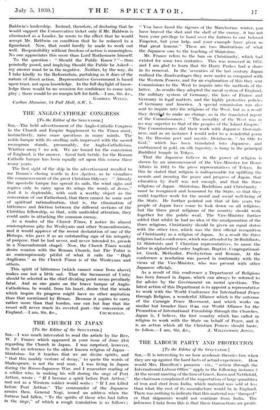THE ANGLO-CATHOLIC CONGRESS
[To the Editor of the Srxervrou.]
Sia,—The bold advertisement of the Anglo-Catholic Congress in the Church and Empire Supplement to the Times must, instinctively, raise some questions in many minds. The noble barque with its swelling sails impressed with the sacred monogram stands, presumably, for Anglo-Catholicism. Whither away ? we ask. We are bound for the conversion of England, is the answer. Good luck betide. for the Roman Catholic barque has been equally set upon this course these many years.
The first sight of the ship in the advertisement recalled to me Renan's closing words in Les Apitres, as he visualizes the commencement of the great Christian Odyssey—" Already the apostolic barque has spread its sails, the wind sighs and aspires only to carry upon its wings the words of Jesus." And it is deplorable, with such a worthy object as the conversion of our Fatherland, that there cannot be some sort of spiritual rationalization, that is, the elimination of bitterness and friction between the different sections of the Christian fellowship, so that, with undivided attention, they could unite in attacking the common enemy.
As a reader of the Church Times, I notice its almost contemptuous pity for Wesleyans and other Nonconformists, and it would approve of the recent declaration of one of the Bishops, who gave it as an outstanding sign of his integrity of purpose, that he had never, and never intended to, preach in a Nonconformist chapel. Now, the Church Times would desire reunion with the Roman Church, but The Tablet is as contemptuously pitiful of what it calls the " High Anglicans " as the Church Times is of the Wesleyans and others.
This spirit of bitterness (which cannot come from above) makes one not a little sad. That the Sacrament of Unity should be selected as the chief dividing point seems peculiarly fatal. And as one gazes on the brave barque of Anglo- Catholicism, he would, from his heart,• desire that the winds which inspire its progress might have no other aspiration than that mentioned by Ronan. Because it aspires to carry rather more than that burden, one can but fear that the vessel will never reach its coveted port—the conversion of










































 Previous page
Previous page